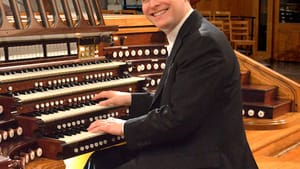Stay in the Loop
BSR publishes on a weekly schedule, with an email newsletter every Wednesday and Thursday morning. There’s no paywall, and subscribing is always free.
Fantastic beasts
Philadelphia Orchestra presents 'British Isles Festival, Week One: Handel and Britten'

The Philadelphia Orchestra’s ongoing tradition of locale-themed “Winter Festivals” have, in recent years, highlighted the musical legacies of Paris, Vienna, and St. Petersburg. The 2018 Festival tours the British Isles over the course of three weeks, beginning with a program that puts one of the United Kingdom’s most respected living composers in conversation with two historical giants.
From the podium, music director Yannick Nézet-Séguin described Sir James MacMillan’s A Scotch Bestiary: Enigmatic Variations on a Zoological Carnival at a Caledonian Exhibition as “a truly fun piece.” The massive concerto for organ and orchestra was premiered by the Los Angeles Philharmonic in 2004 and receives its first local performances in this series, with Paul Jacobs as organ soloist.
"Liturgical mass on acid"
As the work’s cheeky title suggests, MacMillan takes stylistic cues from three well-known compositions: Edward Elgar’s Enigma Variations, Camille Saint-Saëns’s Carnival of the Animals, and Modest Mussorgsky’s Pictures at an Exhibition. Only the allusion to Mussorgsky — particularly, the opening B-flat Promenade, which MacMillan repeats throughout the 30-minute work — sounded apparent to my ears; Elgar and Saint-Saëns seemed more thematic suggestion than musical reference point.
Instead, MacMillan’s incorporation of jazz and blues styles, unusual percussion instrumentation (including typewriters and temple blocks), and freely overlaid rhythms called to mind avant-garde composers like Edgard Varèse and John Cage.
MacMillan’s Catholic faith has long been an influence on his musical output, and at times the freewheeling organ solos suggested a liturgical mass on acid. Jacobs played the daunting music with humor and distinction, but as a result, the point behind MacMillan’s bellicose cacophony became harder to glean.
The music was most interesting when Jacobs played in genuine counterpoint with another set of instruments, as in a stirring section entitled “The Reverend Cuckoo and His Parroting Chorus.” The sensitive interplay between clarinet-led woodwinds and organ truly mimicked animal cries. But similar attempts to create order from the pandemonium sounded ungainly and unmusical, and the repeated Mussorgsky theme coming from different instruments grew tiresome.
Although Nézet-Séguin was in whirling dervish mode on the podium, he couldn’t quite coax a unified sound from the massive assemblage of musicians. By the end of the second movement — fittingly titled “The Menagerie, uncaged” — chaos reigned, and I had a headache.
Letting it flow
The maestro seemed more in his element during the program’s second half, which began with a stirring reading of Suite No. 1 from Handel’s Water Music. Conducting freehand, Nézet-Séguin drew an elegant but lusty sound that favored brisk tempos without sacrificing distinctive musical intonation. Richard Woodhams played the work’s oboe solo with his customary refinement. Concertmaster David Kim and principal second violin Kimberly Fisher gracefully handled the violin-solo duties.
The concert ended with a beautiful rendition of the “Four Sea Interludes” from Benjamin Britten’s Peter Grimes. A landmark of opera in English, Peter Grimes masterfully explores themes of loneliness, community, repression, mob mentality, and violence.
Nézet-Séguin and the orchestra managed to communicate these subjects with pinpoint clarity, condensing the opera’s landscape into 15 richly textured minutes. These selections seemed most aligned with the festival’s theme; one could almost smell the salty air of Aldeburgh, the seaside village where Britten made his home, which served as inspiration for the opera’s unnamed borough setting.
Nézet-Séguin, who becomes music director of the Metropolitan Opera in 2020, has identified Britten as a composer he wants to conduct when he takes up his new post. After this masterful take, I’d love to hear what he can do with the entirety of Peter Grimes.
What, When, Where
British Isles Festival, Week One: Handel and Britten. Yannick Nézet-Séguin, conductor; Paul Jacobs, organ. Sir James MacMillan, A Scotch Bestiary: Enigmatic Variations on a Zoological Carnival at a Caledonian Exhibition, for organ and orchestra; Georg Fredric Handel, Suite No. 1 in F major from Water Music; Benjamin Britten, "Four Sea Interludes," Op. 33a, from Peter Grimes. Philadelphia Orchestra. January 11-13, 2018, at the Kimmel Center’s Verizon Hall, 300 S. Broad Street, Philadelphia. (215) 893-1999 or philorch.org.
Sign up for our newsletter
All of the week's new articles, all in one place. Sign up for the free weekly BSR newsletters, and don't miss a conversation.
 Cameron Kelsall
Cameron Kelsall